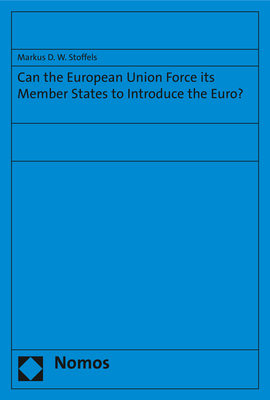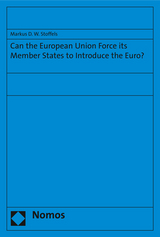Can the European Union Force its Member States to Introduce the Euro?
Seiten
In this study, the author addresses the intriguing, topical but little-studied question of whether the (old and new) EU Member States should, upon accession to the EU, be obliged to introduce the euro. To begin with, he examines—while deliberately ignoring the problematic exchange rate convergence criterion—whether introducing the euro should in principle be obligatory. After having answered this question in the affirmative, he takes a closer look at the exchange rate convergence criterion. He concludes that a country’s formal participation in the ERM II is a necessary but insufficient requirement for that country to meet the exchange rate convergence criterion. However, since ERM II membership is, for its part, voluntary, this also makes a country’s decision to introduce the euro completely voluntary. Accordingly, a Member State like Sweden is entitled to simply circumvent introducing the euro by simply refraining from participating in the ERM II. The author continuously refers to how different groups of Member States have been treated in the past with regard to them introducing the euro.
| Erscheinungsdatum | 28.08.2019 |
|---|---|
| Sprache | englisch |
| Maße | 153 x 227 mm |
| Gewicht | 159 g |
| Themenwelt | Recht / Steuern ► EU / Internationales Recht |
| Recht / Steuern ► Öffentliches Recht ► Völkerrecht | |
| Wirtschaft ► Volkswirtschaftslehre ► Makroökonomie | |
| Schlagworte | Common Currency • Economic and Monetary Union • EMU • ERM II • EU • Euro • Europäische Union • European Union • Exchange Rate Mechanism II • Gemeinschaftswährung • Währungspolitik • Währungsrecht • Währungsunion • Wechselkursmechanismus II • WKM II |
| ISBN-10 | 3-8487-6058-4 / 3848760584 |
| ISBN-13 | 978-3-8487-6058-9 / 9783848760589 |
| Zustand | Neuware |
| Haben Sie eine Frage zum Produkt? |
Mehr entdecken
aus dem Bereich
aus dem Bereich




